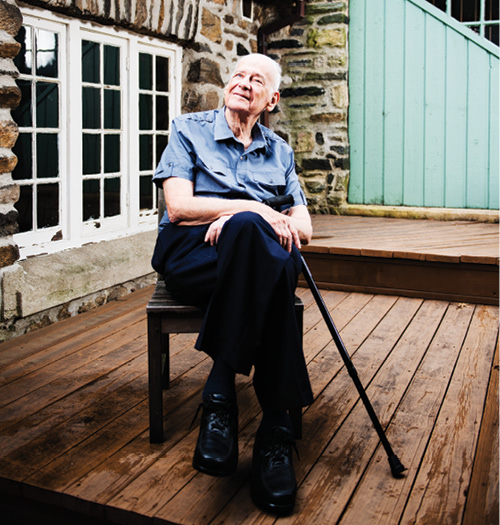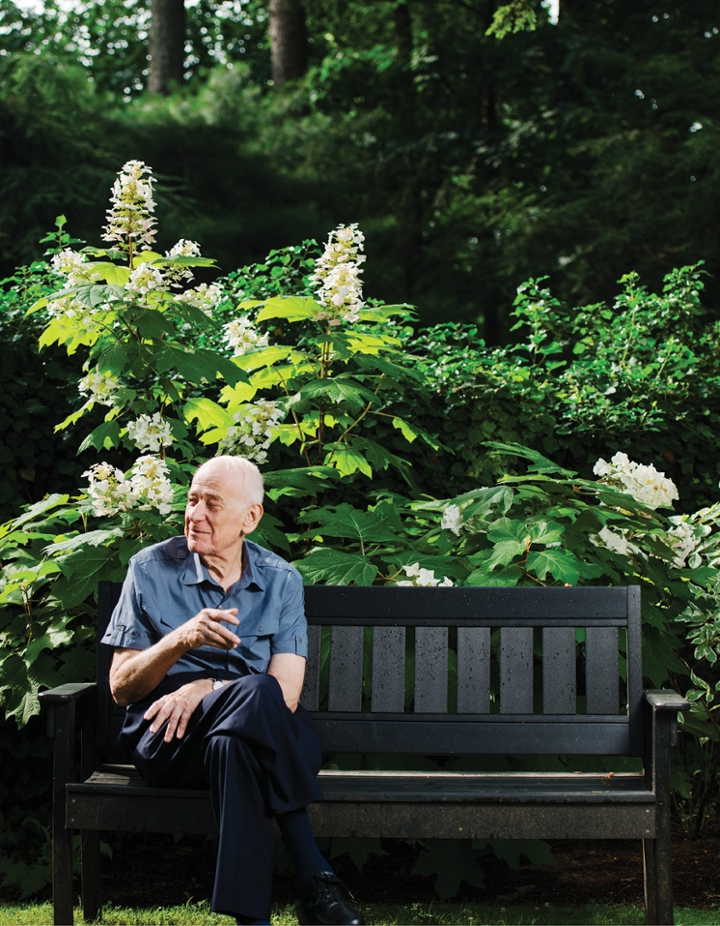
By Katharine Reece MFA ’12
Photos by Laura Barisonzi and Gary Gladstone (SLC Archives)
Reproduced from the Fall 2014 issue of Sarah Lawrence magazine
Late September, 1965. Car windows agape, tires tracing Interstate 87 on the way from Manhattan to Sarah Lawrence College, literature teacher Ilja Wachs held a cigarette between his fingers and didn’t care a whit for the ash whipping through the open air in his car. One of Bach’s Brandenburg Concertos blasted from stressed speakers, and the cigarette transformed into a baton as Wachs dipped his head in time with the meter, the sun warm on his face. White clouds packed the sky over the Hudson River. The skin of the river puckered into rows of tiny, metallic moguls at the behest of a light wind. Wachs thought about the truth of what Melville wrote in Moby Dick, that “meditation and water are wedded for ever.” He was 34, and skeptical that life could generate a moment more perfect than this. Just as a painter who is halfway through a piece can faintly discern how the shapes and brushstrokes might coalesce into a masterpiece, Wachs was on the cusp of seeing how the story of his life would take shape.
Wachs is now 83 years old. Cancer ruined part of his lungs in 2006, and he no longer smokes. He still has a shock of long white hair, which he swoops up over the balding crown of his head when he smiles or is thinking deeply before speaking. Folding his 6'3'' frame into his rusting Toyota Camry is no longer an easy task. When he stops for coffee in the morning, at a deli on Palmer Avenue, the two Irish women who own the place try to convince him to stay in the car, offering to serve him through the window. It is 2014, and Wachs often wonders how to confront the final part of his journey—a journey he does not want to end. In the 49 years since he first began driving to Sarah Lawrence, he’s grown tired of his creaking body, but he is not tired of the world, and he is not tired of teaching great books to his students. Through those books, he teaches them how to behold as much beauty as they can stand, how to love well, and how to give themselves to the human community. And like those books, his own story reminds us that we have been given the opportunity to exist—and that life is beautiful.
The Train and the Tunnel
In the early 1900s, Isaak Wachs, Ilja’s father, moved to Vienna, then considered the most progressive city in continental Europe because it recognized the rights of Jews. Isaak became a successful lawyer—a street, the Izaakwachs Strasse, was named in his honor after he defended trolley workers who were on trial for going on strike. He was respected as the chief lawyer for a range of unions and left-wing organizations that were being persecuted by the neo-Fascist regime. But when Hitler annexed Austria in March of 1938, the rights of Jews melted along with winter into spring. Ilja remembers crouching below the kitchen table and listening as his mother, Sarah, convinced his father they must leave.
“I realized at that point that something had broken through—that my capacity to love, which had been buried in so many different ways, was returning.”
What followed is now a composite of shaded memories, the chronology blurred by terror: Ilja’s parents left him behind with his nanny and months passed. When Sarah tried to retrieve him, she was prohibited from reentering Vienna. Isaak was imprisoned in a French concentration camp, but through his political connections he contacted a woman known for smuggling children into Switzerland. The woman picked Ilja up and took him to the train. “This is going to be very dangerous,” she said. He was told not to talk to anyone, and to address her as Mutti, the German diminutive for mother. To ensure he would not be questioned, she slipped a Mickey Finn in his milk. He woke up in Switzerland. Somehow his father was released from the concentration camp. Somehow their small family found themselves in Paris. Somehow they ended up on one of the last ships allowed to leave from France.
The hours faded as their ship broke across the surface of the North Atlantic Ocean, and a brilliant, clumsy Austrian boy who learned to crawl on plush oriental rugs found himself beneath the pavement of Brooklyn, standing on a subway platform next to shell-shocked parents. Out of the orifice of a square-shaped, long cave came a rickety train shattering along dirty tracks, the noise so loud the boy covered his ears, shut his eyes. He spoke no English. His family would never speak of what just happened.
The Bookcase
Wachs doesn’t remember the end of the war, but its aftermath was a phantom limb, an aching presence that haunted his family. While Brooklyn Dodgers games aired on radios and children spilled into the street after school to play, Isaak slipped into a depression that would darken his skies for the remainder of his life. The trauma of his forced emigration left him unable to continue practicing law, and he eventually took a job as a cashier at a local Jewish cafeteria, where he occupied his mind by collecting rare coins, replacing them in the cash register with his own, ordinary ones.
Ilja learned English by absorption; he was walking down Rogers Avenue one day when he realized he could suddenly read all the shop signs—“Luigi’s Pizza” and “Cigarettes, 10 Cents.” But he still felt displaced and alien, a feeling compounded by the fact that he never had his own room in the various apartments his family filtered through in Brooklyn. He slept on couches and fire escapes. He had no friends. “I felt what some of Kafka’s heroes—I didn’t know that at the time—feel,” Wachs said recently, “that I was just a stranger in this world. And that my parents were strangers, too. Here they were: depressed, torn from their roots, failures from their own perspective.” His mother, a nurse, had developed a radical obsession with health, which created a stringent atmosphere in their home. But Wachs loved his father fiercely, and gave over countless days of his adolescence trying to coax him out from under the clouds.
Sports folded Wachs into American culture and provided him with an escape from home. At 12, he began playing ball with other neighborhood kids—stick ball, slap ball, punch ball—whatever game they could create with broomsticks and rubber balls. His family eventually moved across from Ebbets Field, and Wachs could see part of the diamond from their fire escape. After one of the games, Wachs was waiting outside the stadium for autographs from the players when a guard began taunting him. “You Jewish sonofabitch,” he yelled. “Get the hell out of here!” Mickey Owen, the Dodgers’ catcher, grabbed the guard and said, “Don't you ever talk to anyone like that again!” Owen invited Wachs to sit in the dugout while the team practiced. Wachs still says that sports saved his life.
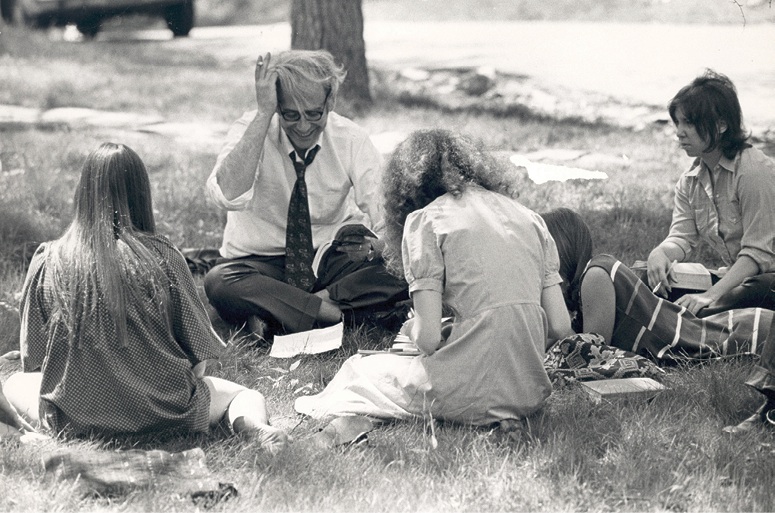
He also began reading. Prying open his father’s locked bookcase with a knife in the middle of the night, he stole a copy of Dostoevsky’s The Idiot, which Isaak had forbidden him from reading, saying that it would upset him too much—that Dostoevsky’s fantastical nature might make it harder for Wachs “to come to terms with life.” His mother prohibited him from keeping a light on after 10 p.m., so Wachs used a flashlight, sometimes even an entire lamp, under the covers of his makeshift bed. He finished the book in three nights. “I started going into an orgy of reading,” he says, “obviously, in some respects, to just escape the depression of my household and my isolation from boys my own age.” He soon devoured the rest of the Russian writers that populated Isaak’s bookcase, and his father’s warning ultimately proved appropriate: “Too many of my initial experiences took place in the world of fiction rather than reality,” he said. “My first sexual experience in John Dos Passos Trilogy USA; the first murder I committed was in Crime and Punishment; my first love in Goethe’s Sorrows of Young Werther, and my first experience as a revolutionary in Malraux’s Man’s Fate.” His mother believed that spending hours reading was bad for the brain, so Wachs eventually took his habit to the Brooklyn Public Library.
As he sprouted into a tall, lanky teenager, Wachs began suffering from anxiety attacks in school, and at one point panicked to the point of paralysis. Soon after that, he dropped out and began frequenting local movie theaters, sometimes hiding out in one theater for an entire day and entertaining fantasies about being John Wayne. He also escaped to Union Square to join a variety of Communist-sponsored organizations. A 13-year-old Wachs even made believe to himself that he thoroughly understood Marx’s Das Kapital. At the time, party leaders encouraged young sympathizers to take on factory work in order to organize the proletariat, so Wachs started laboring in New York’s garment factories, carting around heavy boxes of buttons on a bicycle. The righteousness of political organizing appealed to him. “My experience in childhood left me with a sense of distrust of the world, with feelings of isolation and estrangement, and with a craving to recover what I imagined to be the lost paradise of my childhood,” he said. “I dreamt about a revolutionary apocalypse that would bring the heaven of equality and justice on earth”—an earth in which injustice seemed woven into the structures that kept it in motion, and in which, he well knew, people could be so hideous to one another.
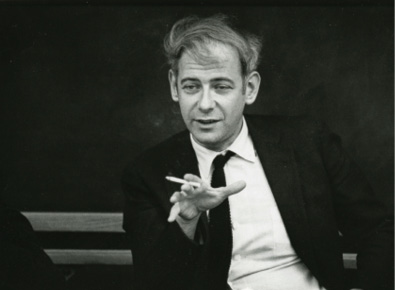 His father finally intervened, finding a psychoanalyst who worked with Wachs and got him well enough to go back to school. But as a freshman at a public high school in Brooklyn, still mostly without friends, Wachs regularly interrupted his teachers to dispute their interpretation of history from a Marxist perspective, stressing class warfare as the agent of all historical events, and he was quickly expelled. The budding firebrand had one thing going for him, though: he was off-the-charts brilliant. He landed a scholarship at the prestigious and progressive Adelphi Academy, where he finally settled into a formal education. He played center for the basketball team, became editor of the literary journal, and found a place in the social strata. His teachers celebrated the scope and strength of his mind, and the experience of being both acknowledged and affirmed was transformative for Wachs—an experience that continued as he took a sizeable scholarship to Columbia University to study literature.
His father finally intervened, finding a psychoanalyst who worked with Wachs and got him well enough to go back to school. But as a freshman at a public high school in Brooklyn, still mostly without friends, Wachs regularly interrupted his teachers to dispute their interpretation of history from a Marxist perspective, stressing class warfare as the agent of all historical events, and he was quickly expelled. The budding firebrand had one thing going for him, though: he was off-the-charts brilliant. He landed a scholarship at the prestigious and progressive Adelphi Academy, where he finally settled into a formal education. He played center for the basketball team, became editor of the literary journal, and found a place in the social strata. His teachers celebrated the scope and strength of his mind, and the experience of being both acknowledged and affirmed was transformative for Wachs—an experience that continued as he took a sizeable scholarship to Columbia University to study literature.
Though he rose to the top of his class at Columbia, Wachs continued to move through the world as an anxious man, fearful of most of his peers and always most comfortable when discussing ideas with his teachers. He studied with literary critic Quentin Anderson and the great classicist Moses Hadas, both of whom spent late evenings with him discussing literature over drinks and long dinners at their apartments in Manhattan. Wachs was moved by the intensity of their commitment to literature as the highest form of human expression. “The lengths they went to communicate their love and understanding made me want to follow in their footsteps,” Wachs says. He still regularly attended peace demonstrations in Washington, DC, but Columbia and the great works he was reading broadened his political view of the world. He couldn’t unsee the beauty and mystery of the human condition that he experienced when he read Aristotle, Shakespeare, Homer, and Cervantes, and he no longer believed life could be reduced to simple economics, or that history was simply a catalogue of exploitation.
The worlds he found inside books no longer swallowed him as they had when he was a child; rather, they imbued him with bright hope that he could find meaning in suffering. “When we experience the patterns of meaning in great literature,” he says now, “we’re inspired to make our own lives less passive and accidental, and more coherent and purposeful.” For Wachs, studying literature at Columbia taught him that he could make meaning out of the seemingly disparate pieces of his life, and that those pieces could be reassembled into a whole.
When Wachs arrived at his senior year in college, he returned to his father in Brooklyn and told him he was considering law school. “What I want to do is be a lawyer like you,” he told Isaak. “I want to save the world, on my own terms.” Isaak demurred, and told him to take a few law classes. Ilja did, and reported that he found it boring, but he didn’t mind. This time, Isaak spoke strongly: “Don’t do it,” he said. “I wasn’t only using the law to effectuate social change, but I loved the law—I loved writing briefs, I loved researching cases, I loved preparing witnesses for cross-examination. I loved the whole process.” Then, he said something that Wachs will never forget: “Don’t just look for a thing to do in the world which involves your effectiveness as a citizen, but do something whose process gives you pleasure.”
Wachs moved easily through Columbia’s PhD program in literature, but when it came time to write his dissertation, he felt yet again like a frightened adolescent, and he panicked. He loved studying literature, but writing strangled him with anxiety. Devastated by his stillborn dissertation, he withdrew from Columbia.
The Birthday Cake
Wachs spent the next few years working a number of odd jobs—welfare investigator, short-order cook, reporter for a union newspaper, proofreader for an editorial agency. His income paid for sessions with a psychoanalyst four times a week, and for trips to Washington, DC, to participate in demonstrations for the Civil Rights movement. Between apartment leases, he occasionally lived out of his car, parking on side streets in Manhattan and falling asleep while proofreading encyclopedias. Something fundamental within him was still dwarfed. Wachs says that these years, which represented one of the lowest points of his life, helped him in ways he’s extremely grateful for—and he tells his students this now, when they’re confronting potentially tough years after graduation. Working outside the academic world, alongside people who primarily found meaning in relationships, taught him something important about the human community and the potential for a fuller life. For example, Wachs and his parents had never celebrated birthdays, but at the restaurant where he worked, the staff baked birthday cakes for one another and would stay late to drink and laugh into the night. Enough of these types of experiences accumulated, and one day, Wachs drove to Brighton Beach and lay on the sand. The beauty of the water and the sun, framed by floating mountains of white clouds, unlocked something in him, and he began to cry. “I realized at that point that something had broken through— that my capacity to love, which had been buried in so many different ways, was returning.”
Soon after his experience on the beach, a friend told him about a position teaching at Queens College. Even though Wachs didn’t have an advanced degree, one of his former teachers, literary critic and author Lionel Trilling, wrote him a letter of recommendation and he got the position. After his classes let out in the evening, he would hang around with his students and talk to them. “I loved it,” he says. “I found that just by being me and by teaching, I could, you know, establish relationships with students, which were relationships of loyalty and honesty and of openness. And I found, much to my surprise, that that was natural to me.” He devoted himself to the landmark SEEK program—the Search for Education, Elevation, and Knowledge—at Queens College, helping disadvantaged students to attend college. He eventually became the curricular head, and became dear, lifelong friends with one of the faculty.
In the mid 1960s, Sarah Lawrence College had a job opening on the literature faculty. Wachs had been interested in the College since the Army-McCarthy hearings in 1954, when President Harold Taylor said that he would never fire anyone who was a member of the Communist Party. Wachs’ first day on campus, though, he grew suspicious. Coming from non-picturesque Queens, he was overwhelmed by the sensual beauty of the campus. His office had a window by a tree, and as squirrels romped up and down the branches, guilt overwhelmed him. At the time, Sarah Lawrence students were all female and mostly white and wealthy. His students at Queens College were mostly underprivileged or minority students, and he cared deeply about them and his ability as a teacher to help alter their circumstances. He felt that he should be teaching the students who needed him, or any committed teacher, the most.
“Anyone who has given themselves up to the vitality and depth of a Tolstoy world is unlikely to be fully satisfied with a gray world of moneymaking or status seeking.”
His first course at Sarah Lawrence in 1965 was a First-Year Studies overview of literature. He was teaching a collection of essays about alienated labor, when one of his students calmly declared that it didn’t matter where she worked, she wouldn’t feel alienated. “Oh, come on,” Wachs protested. “Suppose you were an elevator operator and you spent a whole day, all your life, riding up and down in the elevator. What kind of experience would that be?” “I wouldn’t mind at all,” she replied. “I’d write a novel in my head while I was doing it, and then go home and write it down.” Her answer may have been slightly naïve, but Wachs knew then that he would learn something important from these women, that he was in a place where people possessed “optimism and faith in the ultimate benevolence of existence”—qualities of life in which he was only beginning to believe. And he also knew that he had something important to teach them about the reality of the way most people live.
His years of psychotherapy had given him an acute ability to listen and an uncanny intuition into students’ lives, which were useful in conferences with students. “Sooner or later, students will begin to talk about where they come from, what their past has been like, what frightens them, what attracts them, what some of their ideals are,” Wachs says. “That enables you to help link what they’re studying to themselves. With that kind of knowledge, you can help them realize the meaning of a given text to their lives.”
Wachs was impressed by his students’ social consciousness, which was often reinforced by their experiences in his class. “Any-one who has given themselves up to the vitality and depth of a Tolstoy world, for example,” he says, “is unlikely to be fully satisfied with a gray world of moneymaking or status seeking.” When Wachs began teaching, the protests against the Vietnam War were at their height. Students marched with him into Bronxville holding daffodils and singing peace songs, and he organized a group of students whose parents were Wall Street executives, leading anti-war seminars at their homes. He remembers both students and faculty sharing “a politics that was about the humanistic project of correcting injustices, opposing what we considered to be an unjust war, fighting against discrimination of all kinds.”
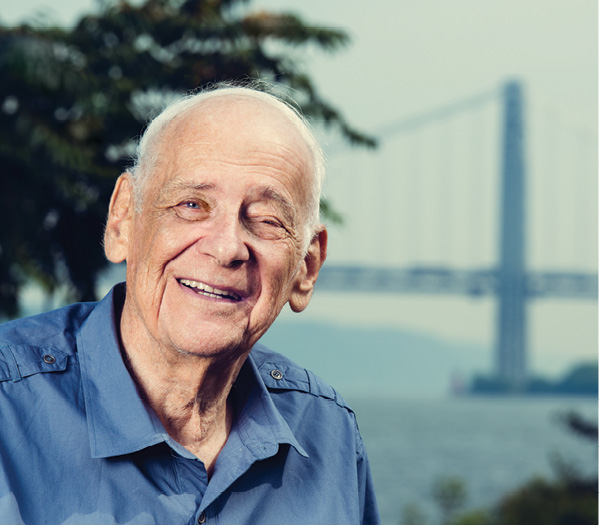
In the fall of 1968, he worked with Kenneth Wentworth (music) to establish the Cooperative College Center, which drew from SEEK funding and helped disadvantaged students from Mount Vernon to enter college—a project of which he remains immensely proud. Wachs remembers being buoyed by his sense that Sarah Lawrence was a real community, inspired by a sense of common values, the absence of ranks, and minimal administrative hierarchy. In those days, he says, the commitment to a common set of values also strengthened the collaboration between faculty and students. Wachs recalls a student who came to conference one day and asked, “Ilja, do you mind if I ask you a personal question?” He told her it depended on the question. She proceeded to say, “Do we give you back enough?” After gulping a few times, he was able to reply, “Yes. Yes, you do.”
He was awarded tenure in 1969. In 1980, he was elected to serve as dean of the College until 1985, and then he returned to teaching and served as the faculty representative on the Board of Trustees. Around 1,500 students have sat across from him in his office, many with tears filling their eyes, many who now send him e-mails or cards, or find him on Facebook, thanking him for changing their lives. A handful of his former students have become colleagues and still teach at Sarah Lawrence: literature teacher Fredric Smoler, writing faculty members Melvin Bukiet, Brian Morton, and April Mosolino.
One year shy of 50 years at the College, he is still teaching. He estimates he’s read War and Peace, Anna Karenina, The Brothers Karamazov, and Middlemarch each at least 30 times, and their power has yet to diminish. The books he teaches are ripe with instruction for how to live well, and through teaching them, Wachs continues to express his desire for a world in which human beings—rather than being splintered and set off against one another—are part of a living whole.
Coming Home
Wachs’ family, in many ways, carries the torch of his own social consciousness, and he says he feels an intense sense of pride in their values and accomplishments. His son was a campaign organizer for the Democratic Party and now is vice president of an organization that works to eliminate childhood hunger in the United States. His daughter worked in the orange groves of Florida helping undocumented immigrants access health care, and she now helps adults without a high school diploma earn their GEDs.
“My childhood left me with a hunger for human contact, a search for a community that would help me to overcome the sense of isolation that I felt,” he says, “and a wish to enter into meaningful contact with others, to not waste any moments of value in experience, since anything that mattered could be abruptly, meaninglessly, and brutally ended.” His best friend, from Queens College, died in 2012. Around that time, Wachs began working, on occasion, with another psychoanalyst, who is helping him accept the reality of his own eventual death. But even in the sadness he experiences along with such thoughts, he radiates a deep sense of contentment. Maybe it is those blue eyes that are somehow both sharp and warm. Maybe it’s the way he folds his hands when he listens, or the width of his constant smile. Life is still a mystery, and he still gets tired. But the fears that used to haunt him have vanished. He has always told his students that there are marvelous consequences from encountering a fully meaningful world in the pages of a book. “Literature, at a bare minimum,” he says, “instructs us about the sacredness of human life.”
